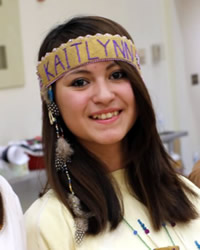Alaskan Athabascan in United States

Photo Source:
National Archives
Creative Commons
|
Send Joshua Project a map of this people group.
|
| People Name: | Alaskan Athabascan |
| Country: | United States |
| 10/40 Window: | No |
| Population: | 18,000 |
| World Population: | 18,000 |
| Primary Language: | English |
| Primary Religion: | Christianity |
| Christian Adherents: | 60.00 % |
| Evangelicals: | 3.00 % |
| Scripture: | Complete Bible |
| Ministry Resources: | Yes |
| Jesus Film: | Yes |
| Audio Recordings: | Yes |
| People Cluster: | North American Indigenous |
| Affinity Bloc: | North American Peoples |
| Progress Level: |
|
Introduction / History
The Alaskan Athabascan people, also known as Dena, are the original inhabitants of Alaska's interior. They belong to the Northern Athabaskan branch of the Na-Dené language family, which includes eleven distinct languages such as Dena'ina, Ahtna, Koyukon, Gwich'in, and Tanana. The Alaskan Athabascan people primarily speak English.
Historically, they lived in small nomadic bands, following seasonal cycles of hunting, fishing, and gathering. Their matrilineal social structure emphasized clan identity and elder leadership. Potlatches—ceremonial gatherings—played a central role in social and spiritual life. Despite centuries of colonization and displacement, the Athabascan people have preserved much of their cultural identity through oral tradition, beadwork, and language revitalization efforts.
What Are Their Lives Like?
Today, Alaskan Athabascans live in rural villages and urban centers across Alaska, particularly along major rivers like the Yukon, Tanana, and Copper Rivers. Many continue to practice subsistence lifestyles, relying on moose hunting, salmon fishing, and berry gathering. Tribal organizations such as the Tanana Chiefs Conference and the Ahtna Cultural Center support education, healthcare, and cultural preservation. Elders remain central to community life, passing down traditions and values. While modern challenges such as economic hardship and climate change affect daily life, the Athabascan people remain resilient and deeply connected to their land and heritage.
What Are Their Beliefs?
Traditionally, Alaskan Athabascans practiced animism, believing in spirits that inhabit nature and ancestral realms. Ceremonies and storytelling were vital expressions of spiritual life. With the arrival of missionaries in the 19th century, many Athabascans converted to Christianity, particularly Russian Orthodox, Catholic, and Protestant denominations. Today, religious beliefs vary, with some blending Christian faith with traditional practices. While church attendance is common, personal discipleship and biblical literacy are often limited. Faith is frequently expressed communally, and there is a need for deeper engagement with Scripture and spiritual transformation.
What Are Their Needs?
The Alaskan Athabascan people need spiritually contextualized outreach that respects their cultural heritage while clearly presenting the gospel. Many have inherited Christian traditions but lack access to discipleship resources that foster personal growth in Christ. There is a need for Bible translation and oral storytelling that aligns with Athabascan linguistic and cultural rhythms. Healing from historical trauma and restoration of identity in Christ are critical spiritual needs. Ministries that build trust and long-term relationships can help bridge gaps between tradition and transformation.
Prayer Points
Pray for the revitalization of Athabascan languages and for Scripture to be translated into these heart languages, that the message of the gospel may be heard in the language of the people. Pray asking God to raise up indigenous Christian leaders who can disciple others within their tribal communities, empowering them to share Christ's love with authenticity and cultural relevance. Pray also for healing from generational trauma, that the peace of Christ may restore spiritual identity and bring wholeness. Finally, pray for ministries that are culturally sensitive, ones that honor Athabascan traditions while faithfully sharing the hope of Jesus with those who need it most.